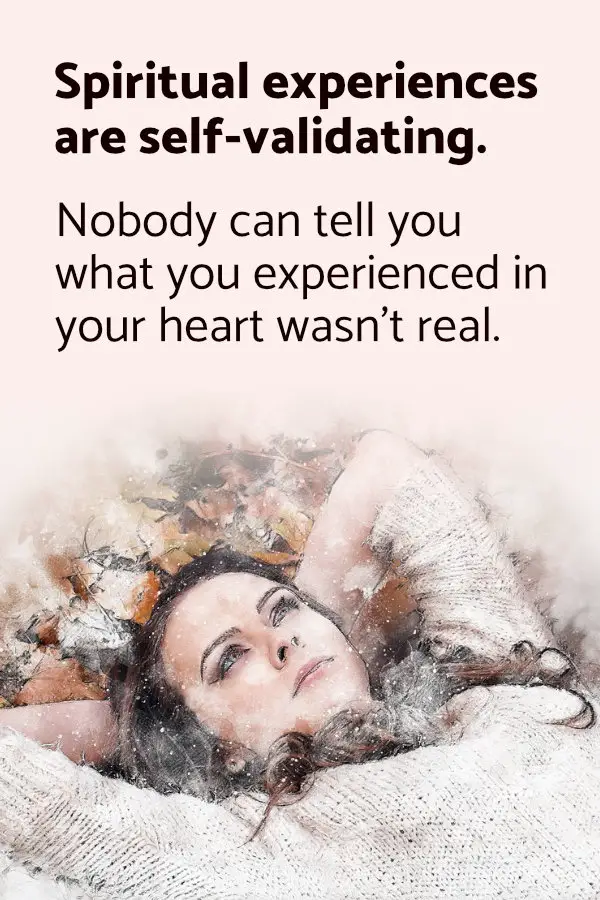If you’ve ever doubted or struggled with believing your spiritual experiences are real, then this post is for you.
I’ve struggled for years to come to terms with my woo-woo side.
I grew up in a very science-based atheist household. We had a weekly subscription to Science News. Meanwhile, I would have long conversations with my stuffed animals and the stars about the meaning of life. I could feel magic in the air, but had no (acceptable) words for it.
When I got to college, I discovered Wicca, Buddhism, and the many mystical traditions in the world’s religions. I realized that spirituality was far older than science, and touched me in ways that hard data just couldn’t.
As I’ve lived my life, I’ve found friends who can walk that line between having a deep appreciation for empiricism, technology, and what it has given us…and a suspension of doubt in order to explore the mystical, the magical, the Divine, and the sublime.
What I have come to accept is that subjective experiences cannot be validated (or invalidated) by objective reality. Sure, you can figure out the exact neurons that fire in a spiritual experience. You can analyze brainwaves. You can do all the science you want to the brain, but that will never tell you the nature of experience itself. That is subjective.
And from the standpoint of subjective reality, there is no way to validate objective reality is actually real either. We could all be living in a simulation. This could all be a dream. There really is no way to know, because the subjective mind can only reference its own experience as real. In other words, “I think therefore I am”.
That means that spiritual experiences will always be self-validating.
There will always be a way to explain a subjective experience as some form of self-delusion, cognitive bias, magical thinking, etc. And yet, that doesn’t really invalidate the experience. It just offers an explanation that makes sense according to a self-validating framework of objective reality. But subjective reality has its own self-validating framework, based on subjective experience and the meaning those experiences have for the person having them.
As far as I can tell, these are just two different systems and ways of looking at reality and they can’t be reconciled. But if you are willing to accept the paradox, they can co-exist just fine.
This is why I don’t try to explain crystal healing in terms of science.
I find it irritating when people who don’t understand quantum physics try to borrow terms from it and end up just writing sciency-sounding gibberish.
I know that much of what I do cannot be proven and can easily be dismissed as “the placebo effect”. But what I find fascinating is why is there a placebo effect at all? The fact that we heal ourselves by believing we are going to be healed by something means intention and consciousness can heal the body. If crystals do nothing more than concentrate and reinforce this self-healing ability, that seems like a win to me.
The bottom line is that interacting with crystals, energy work, and many other forms of woo-woo healing have been immensely helpful & meaningful to me. They work for me. And at the end of the day, I’m not sure what else matters.
If you can’t suspend doubt, you can’t have a spiritual experience.
The bottom line is that you don’t get to have a spiritual experience unless you are willing to.
It’s an interaction of your heart with the heart of the Divine that takes place entirely inside your own consciousness. Because of free will, it can’t happen without your consent. Opening your heart–meaning setting aside disbelief & doubt & being willing to experience something profound and unexplainable–is a prerequisite.
The flip side of that truth is that you will never be able to get external validation of what you experienced. It is for you, alone. And it’s up to you to honor that experience and validate it for yourself.
That is the meaning of faith. Faith is not “believing in things that are not real”. It is believing in things that are real to you but not real to others. And that faith is the gateway to a world of magic and mystery.
Faith does not require an absence of doubt–just a willingness to stay curious.
I don’t want to lose my doubt. It keeps me balanced. I think it’s definitely possible to go too far, and for example, reject medical treatment, or refuse to get your kids vaccinated. I honor both subjective reality and objective reality and try to deal with them on their own terms. I think they are both highly valuable, and understanding both is necessary for a healthy, fulfilling human experience.
What about you?
P.S. If you want to do down the subjective / objective rabbit hole, I recommend this free video series by Steve Pavilina. It also discusses how to level-up your manifesting by shifting to a co-creative, trust-based mindset.



